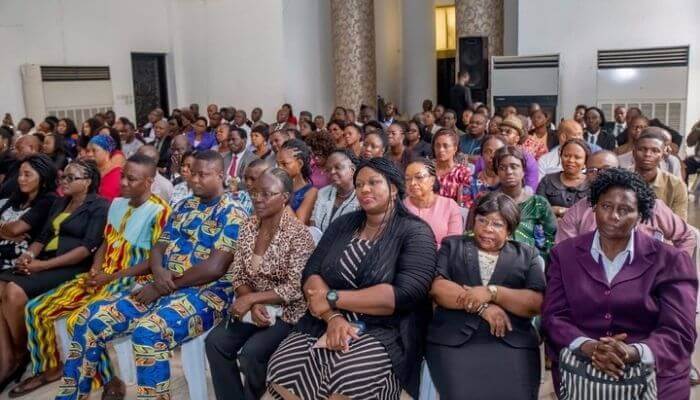BY SANMI OBASA
Civil service is a term used for the government or public sector that is responsible for carrying out the day-to-day administration of the government or implementing policies, laws and judgments enacted by political leaders, lawmakers and judges. A civil servant or public servant is a government employee employed to carry out political leaders, lawmakers and judges policies, laws and judgements for smooth administration and good governance.
It is presumed that civil servants will act with integrity, honesty and in the best interest of the people. Career civil servants are not elected but hired for a tenure that outlives successive elected political administrations formed by winning political parties at the centre and sub-nationals.
Broadly, the term civil servant covers government bureaucrats and the military and para-military agencies.
Advertisement
A similar and broader term for civil service is bureaucracy. Bureaucracy encompasses both government, private and non-profit organisations intending to get the business of political, business and non-business leaders done. It is peculiarly hierarchical with the bottom answering to the top and the top setting the agenda and rule for the bottom. It is non-democratic and much like a command structure. Bureaucrats work in bureaucracy similar to how civil servants work in civil service.
Civil service is the engine room of government and public services, while bureaucracy is the engine room of business and non-business organisations. Depending on where they work, bureaucrats get different designations. In public service, we have a permanent secretary, director general, and director at the top of the hierarchy, while in business or corporation, we have a president, managing director, chief executive officer, general manager, and manager working at the top echelon. The other workers fill the middle and bottom of the ladder. In all, their generic name and job description is administrator; because they administer and work policies, laws and judgements.
Although the government is formed by the winning political party, leader and candidate, who later constitutes the cabinet or executive council of elected and non-elected representatives as the case may be, the real government is the civil service, because it is this permanent body of non elected officials that implements decisions, policies, law and judgments of democratically elected and non elected officials who are the representatives of the people.
Advertisement
The civil service makes or mars government. More importantly, it makes or mars the country and the people. Civil servants determine whether a country will grow, develop, and make progress or not. They even determine whether a country will win any war at all – be it against its external and internal enemies, criminals, war against corruption, nepotism, ethnicity, religious bigotry, etc. They also determine whether the country will go the way of commonwealth or personal wealth; depending on whether they, the civil servants, want the wealth of the nation to themselves or they favour equity. The latter is very germane because the civil servants or bureaucrats control the resources of the country or the organisation they serve.
The civil servants or bureaucrats formulate and implement the budget. They also award and are in charge of all the contracts. Therefore, if there is budget padding, the bureaucrats are the makers. They are in charge of the revenue and expenditure sides of the budget, so if a budget succeeds or fails is their making.
Members of the public usually see politicians as thieves and corrupt, but the reality is, they are mere petty or cookie thieves. They are initiated into stealing by the landlord civil servants who know every corner of the house and where all the goods are kept. Politicians and political appointees are visitors for a fixed term, while civil servants are permanent landlords. A visitor can only know as much about a house as much as the landlord permits.
Political leaders and corporate governors are at the mercy of the bureaucrats both for their success and failure. The civil servants know the organisation inside out, the secret weapon to unleash to keep leaders in line or out of governance. In America, they call them the Washington swamps. They actually rule while the elected officials pretend to rule. Without directly owning a business, they are richer than most business people. They make their fortune from diverse sources. In developing countries, they directly corner the budget and resources. In developing countries, they trade influences and indirectly corner the budget and resources.
Advertisement
The underlying importance of a patriotic, competent and honest civil service in Nigeria has always been lost when discussing important issues of socio-economic development, democracy and progress. It has always been assumed that it is the political leadership that matters, fixes problems and takes blame for failures. The civil service, which is the transmission mechanism of political leadership laws and policies is completely obscured from accountability; yet it is the core of accountability.
The Nigeria service is already broken. Its ascendancy to power and resource control since the entrance of the military into governance has been phenomenal and led to it capturing total power. The military relied more on its top echelon as advisors and experts and they have taken advantage of that to create a swamp.
It is not usual even ‘democratic’ United States to see unelected bureaucrats in charge of national security, foreign policy and the economy. The panacea is for leaders to start to be creative by returning the civil service to its original patriotic role of advising on policies and implementing laws and policies approved by political leaders. Political leaders can do this by being educated, informed and competent on national security, foreign policy and the economy. They should also create mechanisms through which the civil service can be monitored and guided in performing its functions.
In Nigeria, if the Economic and Financial Crimes Commission (EFCC) is ever serious in its work, it should beam more searchlight to the civil servants, who have taken far more than all the politicians collected together since the first republic. Nigeria civil servants and the military in typical kleptocracy and nepotism, have taken more for themselves, their families and benefactors than the rest of the population.
Advertisement
Apart from the fact that it has to be trimmed, it should be professionalised, while at the same time curtailing its access and power to make decisions on resources.
Successive political administrations will continue to see their agenda flounder and be termed a failure if they don’t put the civil service in check.
Advertisement
Obasa writes from Mississauga, Canada.
Advertisement
Views expressed by contributors are strictly personal and not of TheCable.






